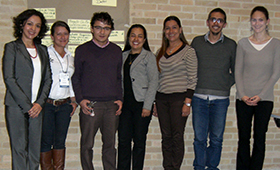Case studies on the costs and benefits of company-based education and training in Colombia
An expert workshop on the subject of “The costs and benefits of vocational education and training” was organised by the BIBB and SENA, the national vocational education and training service (Servicio Nacional de Aprendizaje), as part of “World Skills Colombia 2015”. This was linked to the four current SENA pilot projects relating to dual education and training in the automotive, textiles, poultry farming and food sector and was also used to plan activities for the coming year.

Work planning for 2016 includes the following working packages:
- Preparation of four case studies on the costs and benefits of company-based education and training.
- Finalisation of the “Data Report on Colombian Vocational Education and Training” which was designed based on the BIBB data report and, when completed, is due to be presented to the public as part of a national conference in Bogotá in 2016.
- Specialist support from the BIBB in the continued development of dual education and training in Colombia, including establishing the legal Basis.
Approximately 25 SENA representatives attended the workshop. These included employees from the area of research and statistics, heads of department, members of the committee for dual education and training (Comité Dual), and employees from the department for international collaboration.
Networking between SENA and CONALEP (Mexico), the two Latin American partner institutes of the BIBB

As the BIBB representative at the “World Skills Colombia 2015”, Diana Cáceres-Reebs, project manager for collaboration of the BIBB with Latin America, gave presentations to around 200 conference participants as a keynote speaker in the forums of “International VET Leaders Forum” and “Experiences of dual education and training in Latin America”.
The National Institute for Technical Vocational Education and Training (CONALEP) from Mexico, also a BIBB partner institute, had also been invited, along with the BIBB. Following the presentations, SENA and CONALEP took the decision to network their activities and are planning further collaboration.
Dual education and training plays a key role in the peace process in Colombia
“Dual education and training have a key role to play in the post-conflict phase in Colombia”, according to the director of SENA, Alfonso Prada, in his presentation at World Skills Colombia 2015. Prada regards dual education and training as an accompanying measure which can assist in the ongoing peace process. Here, Prada emphasized the importance of private sector involvement in order to overcome together (state and private sector) the challenges posed by the peace process. In September 2015, the Colombian government and the Farc rebellion agreed to bring the peace negotiations to a conclusion with a peace treaty towards the end of March 2016.
Background of vocational education and training in Colombia
The institutional organisation of the dual model and improving the image of vocational education and training are regarded as major challenges in the Colombian vocational education and training system. Education and training in Colombia is far less respected than a university degree.
In terms of business involvement in initial and continuing vocational education and training, a legal regulation exists in Colombia which requires each employer to pay a social security contribution to SENA on top of the total wages costs (2 % of wage costs). This contributory payment is a precondition of the employer being able to deduct their wage payments from corporation tax.
In Colombia, each company with 15 or more employees is obliged to hire trainees at the end of the theoretical and practical education and training in SENA. The payment of a monthly salary to trainees by companies for as long as the unemployment rate is above 10 % is regulated by law. This amounts to 75 % of the minimum wage during the placement period in the company and 50 % of the minimum wage during the vocational period based in the vocational school. This is specified in a training agreement.
Since the employment rate in Colombia has been at 8.2 % since 2015 (the lowest rate of the last 5 years), companies are now required to pay the full minimum wage as training remuneration. It is therefore all the more important that companies are also informed about the benefits of vocational education and training.
The basis of the cooperation between BIBB and SENA is a cooperation agreement signed by both institutions in April 2011 and which was resigned together with the Colombian ministries for education and training in October 2012. BIBB advises SENA on the promotion and ongoing development of vocational education and training, and in particular on research into vocational education and training. It was possible to establish a Research Centre in SENA thanks to advice and guidance provided by BIBB. BIBB also advises SENA on the development of research competences as on the implementation of research projects.